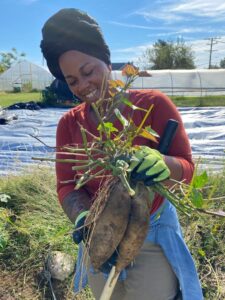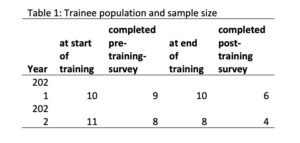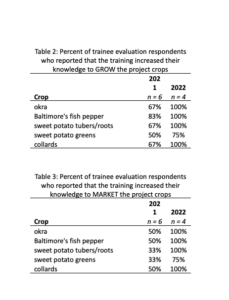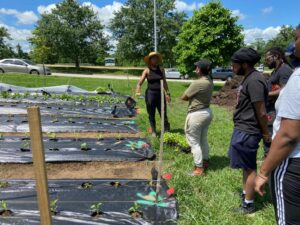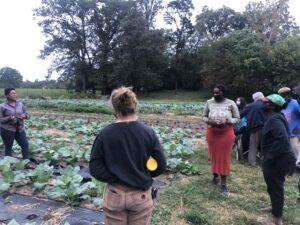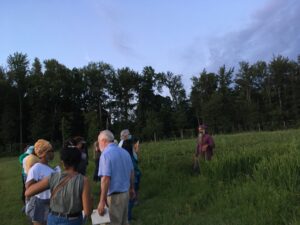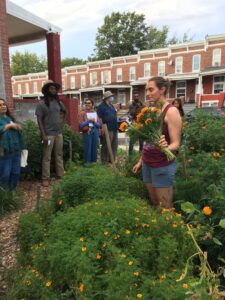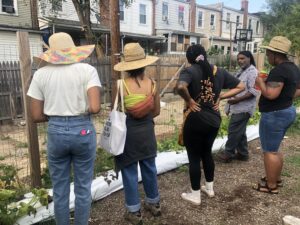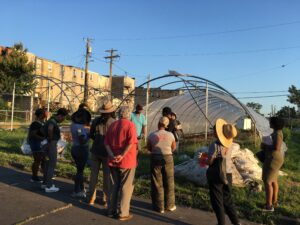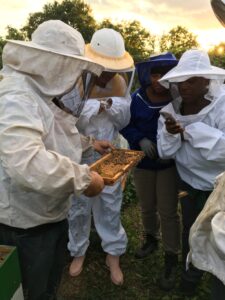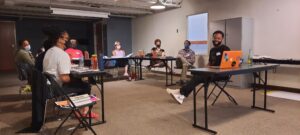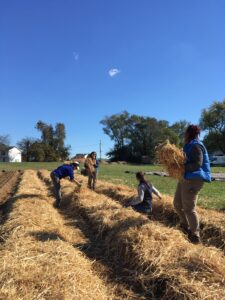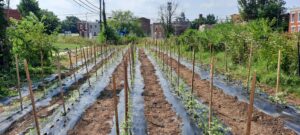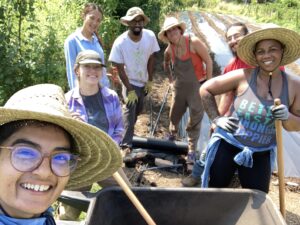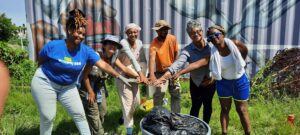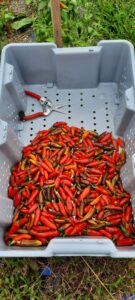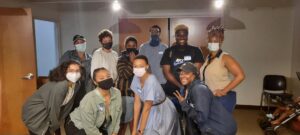Final report for LNE21-419
Project Information
Black farmers are a dwindling population, and majority-Black, food-insecure urban communities in Baltimore lack training infrastructure for new urban farmers. Farm Alliance of Baltimore (FAB) saw an opportunity to begin to reverse both these trends in Baltimore City by piloting a new farmer training program: The Black Butterfly Urban Farmer Academy.
We trained 24 beginner-level Black and Brown farmers to grow ethnic crops using a 3-part model: classroom learning; field day instruction at existing urban farms and at a demonstration site to impact our full 60-farmer membership; and a farmer-to-farmer mentorship program. We worked with experienced Black farmers to plant for different production models, including crops such as: okra, Baltimore's Fish Pepper, sweet potatoes, and collards; and mentored 24 new farmers in agroecology methods such as cover cropping, flail mowing for green manure, and reduced tillage methods.
We hypothesized that this would result in increased market availability of these crops within two years for food-insecure Black communities and small local value-added producers. Our team hosted 200 on-farm demonstrations, and 60 more in-depth consultations over the two years. Black farmers built, piloted and tested new values-based food system chains with small food businesses. This, in turn, we hypothesized, would build food sovereignty.
We conducted three kinds of research activities: (1) evaluating the impact of the training on participant knowledge gains and behavior changes, (2) developing enterprise budgets for two ethnic crops, and (3) assessing the market for ethnic crops grown by Black farmers in Baltimore.
16 trainees completed the training and the post-training evaluation; 300 farmers attended at least one of our 36 open workshops, 25 farm tours, and 12 online classes or webinars. Compared across years, 50% of year 2 trainees reported growing the targeted crops after the training, as opposed to 33% of year 1 trainees.
The majority of the trainees who filled out the course evaluation (n = 16) reported that the training increased their knowledge of how to grow and market ethnic crops (Reported increased knowledge of how to grow: 66% sweet potato greens, 88% sweet potato tubers, 88% okra, 88% okra, 94% Baltimore’s fish pepper. Reported increased knowledge of how to market: 59% sweet potato greens, 75% sweet potato tubers, 88% sweet potato tubers, 81% collards, 81% okra, 81% Baltimore’s fish pepper.).
The increase in trainee adoption of the targeted crops in year 2 of the training, compared with year 1, demonstrates that FAB learned from and improved the training methods over the two years of the project.
Two enterprise budgets were developed, one for okra and one for Baltimore fish peppers. Research outcomes suggest that, even if the farmer increases yields and raised the selling price by 50%, they would not break even on okra or fish peppers at these input costs. Harvesting labor was the biggest expense. Farmers should consider growing okra and fish peppers as a pick-your-own crop. However, even with harvesting labor eliminated, breaking even would still require increasing yields and prices or reducing hourly pay for labor. It is important to recognize that farm profitability is based on the economic history of paying farm labor less than minimum wage.
Trainees grew, harvested, cleaned, and sent to market two ethnic crops: okra and Baltimore Fish Peppers. Crops were marketed via the Farm Alliance of Baltimore's stall at the 32nd Street Farmers Market every Saturday in Baltimore and for wholesale/ institutional sales to food bank distributors/local food businesses.
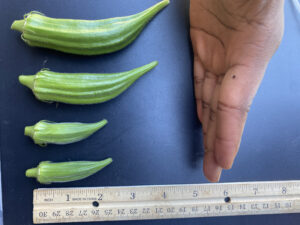
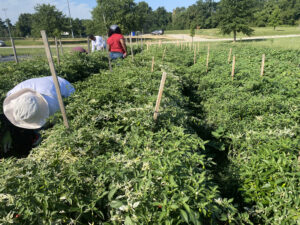
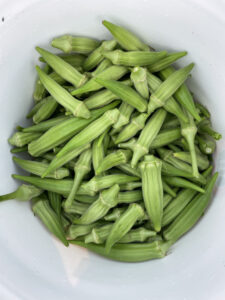
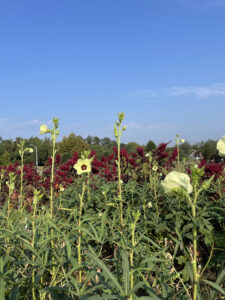
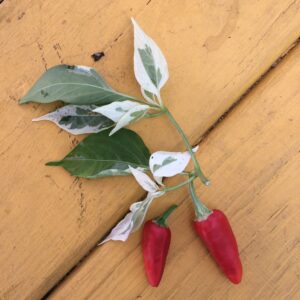
FAB staff will create farmer training infrastructure, including: classroom instruction for up to 20 new Black farmers; 6 experienced farmers will formally mentor those trainees and lead field days for up to 80 farmers to demonstrate agroecological methods. Trainees will grow and market crops including Baltimore's Fish Pepper and sweet potatoes on up to 6 acres, resulting in increased market availability of these crops for local communities and value-added producers. Sustainable methods: cover cropping, flail mowing for green manure, reduced tillage. Focusing on Black farmers, we will build, pilot and test new values-based food system chains to increase food sovereignty.
Opportunity Addressed: Black farmers were a dwindling population, and majority-Black, food-insecure urban communities in Baltimore lacked training infrastructure for new urban farmers. However, we at Farm Alliance of Baltimore (FAB) saw an opportunity to begin to reverse both these trends in Baltimore City through the piloting of a homegrown farmer training program.
Though Baltimore is a majority-African American city (63% according to US Census), its history of redlining and segregation has created geographic isolation and generational poverty for Black communities. These conditions together mean that many of our majority-Black communities lack "food sovereignty" - the ability to control the means of production and distribution of food(National Black Food & Justice Alliance, 2020). Additionally, today, only 1.3 percent of the nation’s 3.4 million farmers are Black, while 95 percent are white. Urban agriculture provides one pathway for community residents to learn and participate in sustainable food production to build food sovereignty. Baltimore's Black-led urban farms include The Greener Garden, BLISS Meadows, Harlem Park Community Farm, Blue Light Junction, Plantation Park Heights, Strength 2 Love Farm, and Whitelock Community Farm. Baltimore's Department of Recreation and Parks leased FAB 6 acres of Farring-Baybrook Park in South Baltimore into sustainable production to provide the surrounding communities with a place to grow food. We received commitments from local value-added food producers who were eager to source produce from Black farmers.
Solution and Approach:
Because of the market opportunity presented for these crops, and the new willingness of city government to release land for sustainable agricultural use, we proposed to use this SARE grant to intensively train 20 beginner-level Black farmers to grow ethnic crops using a 3-part model: classroom learning; field day instruction at existing urban farms and at a demonstration site to impact our full 60-farmer membership; and a farmer-to-farmer mentorship program. We worked with experienced Black farmers to plant for different production models, including crops such as: okra, Baltimore's Fish Pepper, sweet potatoes, and collards; and mentored 20 new farmers in agroecology methods such as cover cropping, flail mowing for green manure, and reduced tillage methods. This resulted in increased market availability of these crops by 2023 for food-insecure Black communities and small local value-added producers. Black farmers built, piloted and tested new values-based food system chains with small food businesses. This, in turn, we hypothesized, will build food sovereignty.
The Farm Alliance’s Co-Executive Director Denzel Mitchell conducted market analysis interviews with local value-added food product business contacts. Several of the businesses hold sourcing from Black business owners as a core value. Each of the businesses committed to supporting our farmers on their journeys to sustainability and stability by purchasing produce to make products ranging from hot sauce to kimchi. This values-based approach informed our work and our outcomes.
Cooperators
Research
What is the impact of "Training Black Farmers to Grow Ethnic Crops for Baltimore Communities" on participant knowledge, skills, attitudes, intentions, and behaviors with regard to sustainable growing and marketing of ethnic crops?
How, if at all, do the project’s outcomes -- training 20 Black farmers to grow ethnic crops for value-added food producers-- affect food sovereignty in Baltimore?
Proposed research:
The proposed research has three parts:
- Project impact on participant knowledge, skills, attitudes, intentions, and behaviors
- Ethnic crop enterprise budgets
- Food sovereignty outcome analysis
Methods:
- Project impact on participant knowledge, skills, attitudes, intentions, and behaviors: This project aimed to increase participant knowledge of how to grow ethnic crops, and increase the number of Black farmers who understand how to sustainably grow ethnic crops in Baltimore City. To document this impact, Little designed a pre-survey of farmer participants to be conducted in year 1, and a post-survey to be conducted in year 2.
- Ethnic crop enterprise budgets: The project team developed enterprise budgets for two of the crops under study, which were determined by which two crops had highest farmer and customer interest in year 1. The team kept records of the costs of production, including inputs and labor. Little identified ranges of sale prices for direct market and value-added product produce customers as part of the food sovereignty impact analysis described below.
- Food sovereignty outcome analysis: A goal of this project was to further food sovereignty in the Black community in and around Baltimore City. One strategy to work towards food sovereignty is to develop and strengthen local food systems and supply chains. This project will do so in three ways: (1) increasing the number of Black farmers in Baltimore City who understand how to sustainably grow ethnic crops of the African diaspora, (2) working with Black value-added product producers to increase the proportion of their vegetable inputs that are grown locally on Black-led urban farms, and (3) making locally grown ethnic crops available to direct market customers. The project team documented these outcomes by (1) conducting farmer participant impact surveys, as described above, (2) pre- and post-surveying value-added product producers about their vegetable input sources, and (3) surveying participant farmers’ direct-market customers about their desire for African diaspora ethnic crops and the value they place on being able to purchase those crops from local Black growers.
Study population(s):
- Project impact on participant knowledge, skills, attitudes, intentions, and behaviors: Participants were farmer participants in the ethnic crop production education program. Farmers were recruited by FAB staff from its own social media audiences in Baltimore, and from among the members of the Farm Alliance of Baltimore as well as the UMD-Extension Master Gardeners' program, Washington DC-based Black farming organizations such as Soilful City and Dreaming Out Loud, and Future Harvest/CASA.
- Ethnic crop enterprise budgets: Data on crop production costs, including inputs and labor time, was collected by the project team while growing the crops. Data on crop sale prices was collected from customers as described below.
- Food sovereignty outcome analysis: Participants were current and potential customers of members of the Farm Alliance of Baltimore. Customer populations were subdivided into value-added product entrepreneurs and direct-market customers.
Data Collection and Analysis:
Collaborator Little was responsible for survey design (informed by farmer participant input), submitting survey questions and methods for human research board approval (UMD Institutional Review Board), and survey result data analysis.
- Project impact on participant knowledge, skills, attitudes, intentions, and behaviors: Pre-Surveys of farmer participants were conducted in year 1. Post-surveys of farmer participants were conducted in year 2. Changes in participant knowledge, skills, attitudes, intentions, and behaviors (crops produced) across the two surveys were compared using Fishers’ Exact Test (using the software JMP®). Fishers’ Exact Test is similar to a Chi Square test, but more appropriate for small sample sizes.
- Ethnic crop enterprise budgets: Data on crop production costs, including inputs and labor time, were collected by the project team while growing the crops. Data on crop sale prices were collected from customers as described below. Enterprise budget templates developed by UMD Extension were used to interpret the production costs and potential sale prices. Resulting enterprise budgets were shared with participants and published to help farmers evaluate which crops are appropriate for their farming methods and markets.
- Food sovereignty outcome analysis: Black entrepreneurs who produce value added products had expressed to FAB that they were interested in purchasing more inputs from local Black farmers. In year 1, these entrepreneurs were surveyed about their current vegetable crop input sourcing, and what prices they currently paid for those vegetables. In year 2, the entrepreneurs were surveyed on whether they had begun purchasing ethnic crops from farmer participants, and if so how much of their previous product inputs could be replaced by these locally produced crops. Farmer participants in the project also surveyed their direct-market customers (CSA, farmers market, etc.) on their interest in purchasing African diaspora ethnic crops from local Black farmers, what prices they would be willing to pay for these crops, and what cultural value they experience by being able to eat culturally appropriate foods grown by members of their community.
Results of surveys of both customer populations (value-added product entrepreneurs and direct-market customers) were primarily analyzed using descriptive statistics. Where comparisons are helpful, data was compared using Fishers’ Exact Test (using the software JMP®). Fishers’ Exact Test is similar to a Chi Square test, but more appropriate for small sample sizes.
Farmer Input:
FAB staff and farmer participants developed the goals and underlying questions of this project: The methods above were designed to gather information to answer their questions. Survey questions were reviewed by FAB member farmers. Farmer participants were trained to administer the market surveys of customers, and conducted the data collection for that part of the research.
Final Results:
24 farmers were trained in how to grow ethnic crops of value to their cultural heritage. 10 of these trainees were documented to start growing these crops as a result of the training and 6 were documented to start selling them. These participants launched new crop enterprises that help build a circular economy where local BIPOC farmers can create income growing culturally relevant crops.
In evaluations, some trainees reported that they were unable to start growing crops due to lacking current access to land to farm. In the longer term, the knowledge gained from the program will benefit these additional trainees. The majority of the trainees who filled out the course evaluation (n = 16) reported that the training increased their knowledge of how to grow and market ethnic crops (Reported increased knowledge of how to grow: 66% sweet potato greens, 88% sweet potato tubers, 88% okra, 88% okra, 94% Baltimore’s fish pepper. Reported increased knowledge of how to market: 59% sweet potato greens, 75% sweet potato tubers, 88% sweet potato tubers, 81% collards, 81% okra, 81% Baltimore’s fish pepper.).
These knowledge gains have the potential to improve food sovereignty in the long term whether the trainees launch farm enterprises or work elsewhere in the food system. Since taking part in the training, 2 trainees have started a new food business, 1 trainee who had a prior catering business started purchasing produce from black farmers, and 4 trainees secured employment in the food and farm sector.
2022 Black Butterfly Urban Farmer Academy program evaluation
Results of 2022 trainee evaluation surveys
Report prepared 12/20/2021 by Neith Little, UMD Extension, for Farm Alliance of Baltimore
Methods and survey sample population
Program evaluation surveys were used to assess the impacts of the Farm Alliance of Baltimore (FAB) Black Butterfly Urban Farmer Academy (BBUFA) training program. Evaluation participants were BBUFA trainees.
Program evaluation surveys were conducted under UMD human research Institutional Review Board project # 1756006-1
In both years, BBUFA trainees were emailed a link to complete a pre-training evaluation survey at the beginning of their training and a post-training evaluation survey at the end of their training. A summary of the trainee population size and evaluation completion rates is reported in table 1.
Results
In the short-term, we expected the biggest impacts of an educational program to be on the participants’ knowledge. In the longer-term, the goal was that the knowledge gained in the training would lead to beneficial behavior changes. In the first annual report, we focused on survey responses that gave us an early insight into the students’ knowledge changes resulting from the training.
Post-training knowledge gains:
In both 2021 and 2022, the majority of BBUFA trainees who completed the evaluation reported that the training increased their knowledge of how to grow each of the four African heritage crops which were the focus of the training program (Table 2). Knowledge gains were slightly lower in year 1 for how to market the crops, but trainee respondents in year two reported equally high knowledge gains on how to market and grow the project crops (Table 3).
2021 Black Butterfly Urban Farmer Academy program evaluation
Results
Results of 2021 trainee evaluation surveys
Report prepared 12/20/2021 by Neith Little, UMD Extension, for Farm Alliance of Baltimore
Summary Results
In the short-term, we expect the biggest impacts of an educational program to be on the participants’ knowledge. In the longer-term, the goal is that the knowledge gained in the training will lead to beneficial behavior changes. In this annual report, we focus on survey responses that give us an early insight into the students’ knowledge changes resulting from the training.
Knowledge change:
The majority of BBUFA trainees reported that the training increased their knowledge of how to grow each of the four African heritage crops which were the focus of the training program. In particular, 87% of BBUFA trainees reported that the training increased their knowledge of how to grow Baltimore’s fish pepper. For the other crops, the percent was lower of trainees who reported that their knowledge increased (okra 67%, sweet potato roots 67%, collards 67%, sweet potato greens 50%).
Half of the BBUFA trainees reported that the training increased their knowledge of how to market okra, Baltimore’s fish pepper, and collards. Thirty-three percent of trainees reported that the training increased their knowledge of how to market sweet potato tubers and greens.
This feedback was used to revise the training materials for year two.
Results details
Question: Please rate your knowledge of how to GROW the following crops BEFORE and AFTER the training.
|
Crop |
% of students with increased knowledge of how to GROW the crop after the training |
|
okra |
67% |
|
Baltimore's fish pepper |
83% |
|
sweet potato tubers/roots |
67% |
|
sweet potato greens |
50% |
|
collards |
67% |
Question: Please rate your knowledge of how to MARKET the following crops BEFORE and AFTER the training.
|
Crop |
% of students with increased knowledge of how to MARKET the crop after the training |
|
Okra |
50% |
|
Baltimore's fish pepper |
50% |
|
sweet potato tubers/roots |
33% |
|
sweet potato greens |
33% |
|
collards |
50% |
Research Conclusion:
(1) IMPACT EVALUATION: The increase in trainee adoption of the targeted crops in year 2 of the training, compared with year 1, demonstrates that FAB learned from and improved the training methods over the two years of the project.
14 participants completed the post-training evaluation. Compared across years, 50% of year 2 trainees reported growing the targeted crops after the training, as opposed to 33% of year 1 trainees.
(2) ENTERPRISE BUDGETS: Two enterprise budgets were developed, one for okra and one for Baltimore fish peppers.
Even if the farmer increases yields and raised the selling price by 50%, they would not break even on okra or fish peppers at these input costs. Harvesting labor is the biggest expense. Consider growing okra and fish peppers as a pick-your-own crop. However,
even with harvesting labor eliminated, breaking even would still require increasing yields and prices or reducing hourly pay for labor. It is important to recognize that farm profitability is based on the economic history of paying farm labor less than minimum wage.
(3) MARKET ASSESSMENT: Surveys were distributed to customers in August 2023. The project was able to survey two of the value-added food businesses which purchase from Farm Alliance of Baltimore, and one of the FAB’s farmers’ market customers.
Education
Year 3: 2023
We completed our final year with our four part structure for the educational portion of this program. BBUFA (Black Butterfly Training Academy) consisted of : Ten (2 hr classroom instruction) taught by Myeasha Taylor and several guest lecturers; thirteen field days at farms located throughout Baltimore and the region, consisting of at least two hours each of hands-on instruction in a particular area of urban agriculture; Shoulder to shoulder farm work at our BBUFA Teaching Farm locations in Baltimore City with supervision by PI Mitchell, Farm Education and Production Manager, Myeasha Taylor, Production Assistant, Andy Szentendrei and our Program Coordinator Alison Worman. Our staff provided mentorship component provided direct mentorship and guidance at our Black Butterfly Farm for 160 hours per intern. We did not host trainees this year. Instead we provided 4 160 hour internships beginning as early March.
The Black Butterfly Teaching Farm was featured in the following publications
Baltimore Magazine Dec 2023
WYPR MidDay segment with Tom Hall
Urban Farming University of Rhode Island 2022 Fall Honors Colloquium- Denzel Mitchell
Hobby Farms Podcast: Growing Good Episode 48 Denzel Mitchell
Special Dialogue: US- Indonesia Urban Farming Project
Year 2: 2022
We again used a four part structure for the educational portion of this program. BBUFA (Black Butterfly Training Academy) consisted of : Twelve weeks of weekly classroom instruction by Myeasha Taylor with a few guest lecturers; Eleven field days at farms located throughout Baltimore and the region, consisting of at least two hours each of hands-on instruction in a particular area of urban agriculture; Shoulder to shoulder farm work at our BBUFA Teaching Farm locations in Baltimore City with supervision by PI Mitchell, Farm Education and Production Manager, Myeasha Taylor, Production Assistant, Andy Szentendrei and our Program Coordinator Alison Worman. Our staff provided mentorship component provided direct mentorship and guidance at our Black Butterfly Farm for 144 hours per mentee. Seven of our trainees completed the full requirements of the program including class instruction, homework, shoulder to shoulder mentoring, field days and final reports.
The Black Butterfly Urban Farm was featured in the following publications in 2022:
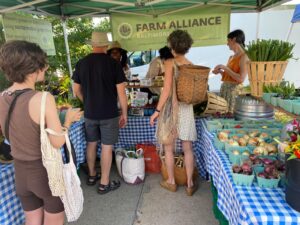
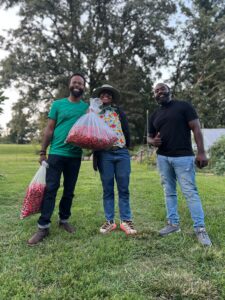
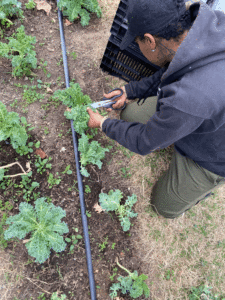
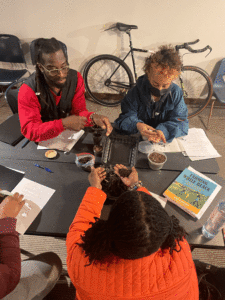
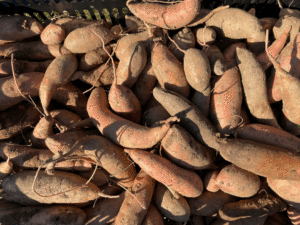
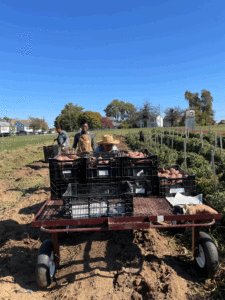
Year 1: 2021
We used a four part structure for the educational portion of this program. BBUFA (Black Butterfly Training Academy) consisted of : Twelve weeks of weekly classroom instruction by Denzel Mitchell with a few guest lecturers; Nine field days at farms located throughout Baltimore and the region, consisting of at least two hours each of hands-on instruction in a particular area of urban agriculture; Shoulder to shoulder farm work at our BBUFA Teaching Farm locations in Baltimore City with supervision by PI Mitchell and our Production Assistant, Andy Szentendrei and our Program Coordinator Alison Worman; and a mentorship component in which experienced Black urban farmers provided direct mentorship and guidance at their own farms for 90 hours per mentee. Four of our trainees completed the full 90 hour mentorship component of this program. PI Mitchell uses the Socratic method with a great deal of hands-on learning in his approach, and he believes it is important that trainees are reading from a text based resource such as books on farms and farming techniques as they learn hands-on and in the classroom. This is why we purchased three books for each student at the beginning of the course.
An excellent newspaper article announcing enrollment for our second cohort can be found here: Farm Alliance’s Urban Farming Training Academy is Welcoming a New Class
See the attached media photo gallery for photos of the trainees, the Field Days, the farm work at our BBUFA Teaching Farm, and the classroom instruction.
Trainee Field Day at Three Part Harmony Farm. Farmer Gail Taylor on far left.
Trainee Field Day at Purple Mountain Organics Farm. Farmer Nazirahk Amen is on far right.
Trainee Field Day at Hillen Homestead in Baltimore
Trainee Field Day at Victory Garden in Baltimore. Trainer is Clayton Williams, second from right.
Irrigation Field Day, Strength 2 Love 2 Farm, West Baltimore
Beekeeping Field Day
Classroom Instruction with PI Mitchell
Working at our Black Butterfly Teaching Farm in Curtis Bay.
Signage at farm
Peppers growing at our other farm site in East Baltimore.
BBUFA trainees at the pepper farm site.
BBUFA trainees at the Curtis Bay site.
Baltimore's Fish Pepper harvested and ready to go to our sauce maker partner, Soilful.
BBUFA trainees, Cohort One.
Milestones
Strauss, Mitchell and Fraser reached 150 new prospective applicants in 2021 for Building the Pipeline of Black Farmers. Of these, 43 did apply, and 10 were accepted to the first cohort of trainees for 2021.
10
3
10
April 30, 2021
Completed
April 30, 2021
Over 150 prospective applicants were reached, and 43 applied. Of these, 10 were selected for the first training cohort. The program was renamed to be the Black Butterfly Urban Farmer Academy (BBUFA).
5 mentor farmers are oriented, trained and ready to train trainees on their own farms and at Farm Alliance site in sustainable growing practices.
5
1
3
March 20, 2021
Completed
June 15, 2021
Three experienced Black farmers were recruited and trained to mentor our BBUFA trainee farmers. Four trainee farmers each completed 90 mentorship hours at the farms belonging to the mentors. This was accompished with the help of Farm Alliance of Baltimore Program Coordinator Alison Worman, who helped with scheduling, transportation, and logistics including making sure COVID safety protocols were followed at mentor farms.
The number of farmers trained and available to serve as mentors was lower than expected due to the impacts of COVID-19. Two of the farmers we had anticipated serving as mentor farmers lost family members in the pandemic or were sick themselves and were unable to serve.
10 African American beginner farmers complete classroom instruction sessions for 4 hours per week (2 hours per session) for 4 weeks for a total of 16 hours of classroom instruction. They learn: Structure and racial stratification in the food system w/ respect to agriculture; agroecology principles; ethnic foodways and agricultural history; business and crop planning& marketing methods. Taught by Mitchell and Fraser with assistance from guest speakers.
10
2
10
2
May 31, 2021
Completed
September 30, 2021
12 weekly class sessions were held in our Farm Alliance conference room from June-October. 10 trainees completed readings, assignments and held classroom discussions using the Socratic method by our PI, Denzel Mitchell.
10 African American beginner farmers and 30 other farmers attend 6 hands-on field training workshops on farm sites in Baltimore and the surrounding region. Each field day will be a minimum of 2 hours long.
40
6
25
May 31, 2021
Completed
October 31, 2021
Nine field days of at least 2 hours each were held at farms throughout the Baltimore region, including our member farms and farms outside of our network. Trainee farmers as well as farmers from our membership network participated in these field days. These were so popular that we kept adding field days to the calendar well beyond the expected six field days. Topics included: Composting, Marketing, Farm Site Development, Tools, Beekeeping, Irrigation, Flowers, Small Sustainable Farming Methods, and Crop Planning. Coordination and event planning was provided by our Program Coordinator, Alison Worman.
The number of farmers from our membership network who participated in the field days was lower than anticipated, likely because they were unable to take time out of their production schedule due to labor shortages because of the COVID-19 pandemic.
We will have identified and reached out to at least 3 Black-owned value-added product makers and/or small market outlets/restaurants to purchase Farm Alliance trainee ethnic crops.
10
1
10
1
May 31, 2021
Completed
September 30, 2021
Soilful City, a Black-owned Washington DC-based grower and hot sauce maker, received our donated crop of Baltimore's Fish Peppers and used them to make Horace Pippin Sauce. Link: https://soilfulcitydc.wordpress.com/soilful-store/
First Cohort of trainees plant and harvest ethnic crops for customers, on Farm Alliance site on city parkland. Trainees harvest, clean and package market-ready farm products on Farm Alliance Site.
10
6
10
September 30, 2021
Completed
September 30, 2021
Trainee farmers planted, cultivated and harvested Baltimore's Fish Peppers for donation/sale to a local Black-owned hot pepper sauce maker. This was done on our Farm Alliance Black Butterfly Training & Demonstration Farm. Peppers were harvested by end of July and were cleaned and packaged by trainees.
First Cohort of trainees will be expected to work on mentor farmers’ farms and learn directly from mentor farmers throughout the mentorship period, with additional visits to work at the farm incubator Production site for a total of 144 hours. Farmer trainees are evaluated by mentors.
10
6
4
3
March 31, 2022
Completed
November 30, 2021
Four trainees completed 90 hours each of mentoring training under the supervision and coaching of our 3 experienced Black farmers: Warren and Lavette Blue of The Greener Garden, and Myeasha Taylor of Cherry Hill Urban Community Garden.
The number of farmers available to serve as mentors was lower than expected due to the impacts of COVID-19. Two of the farmers we had anticipated serving as mentor farmers lost family members in the pandemic or were sick themselves and were unable to serve. The number of trainees able to complete the mentorship was lower than expected because trainees reported they were unable to take time away from their regular jobs in order to complete the hours. Four trainees were able to fully complete the hours.
5 experienced African American mentor farmers receive stipends to compensate them for their time and expertise provided to help develop new farmers.
These 5 experienced African American mentor farmers have their businesses supported by the additional income from this stipend.
5
2
3
March 31, 2022
Completed
November 30, 2021
The number of farmers trained and available to serve as mentors was lower than expected due to the impacts of COVID-19. Two of the farmers we had anticipated serving as mentor farmers lost family members in the pandemic or were sick themselves and were unable to serve.
Second cohort of 10 Black beginner farmers completed classroom sessions
begins classroom phase and another 30 farmers participate in field instruction phase.
40
3
149
24
March 20, 2022
Completed
October 24, 2022
Farm Alliance Baltimore hosted 11 field days and classes with 149 unique attendees on urban and peri urban farms throughout MD and DC.
First Cohort of 10 Trainees complete final exit interview and evaluation to receive Farmer Starter Tool Kit plus free membership in the Farm Alliance of Baltimore.
10
1
8
April 15, 2022
Completed
January 31, 2022
Eight farmer trainees attended a graduation ceremony with commencement speaker, earned a certificate of completion for the BBUFA program, and received a farmer starter tool kit with a scuffle hoe and engraved knife and embroidered BBUFA branded raincoat.
Two of the trainees who began the program had to drop out before the end of the 12 weeks of classroom instruction. Of these, one dropped out because of a work obligation, and the other dropped out because she had to return to her home country to care for family during the pandemic.
Four of the farmers filled out exit evaluations for the program. Their responses included the following quotations:
"Denzel has a lot of hands-on experience. I wish the classroom instructions was less lecture style and more collaborative."
"Yes I found all the classrooom reading assignments where very helpful in gaining knowledge on farming Also the workshops and discussions where very in depth and covered a variety of topics regarding food production and scaling"
"The crop planning workshop was exactly what I was looking for as far as in person class time. Our instructor Myeasha was excellent, prepared, and engaging to listen to and I felt like it was the only in person class that I walked away knowing more than when I came."
To improve the program: "Probably more of a focus on material during class but there is a very clear social side to farming so maybe a sectioned off part on brainstorming and problem solving."
Second Cohort of 9 trainees complete their mentorships with mentor farmers, completed final exit interview, received Farmer Starter Tool Kit plus free membership in the Farm Alliance of Baltimore.
10
1
14
24
March 15, 2023
Completed
December 20, 2022
We began the 2022 cohort with 10 trainees. Mid-program, we gained 3 new trainees while three discontinued their participation. We offered a total of 600 hours of mentor shoulder to shoulder training with 5 mentor farmers throughout the 2022 growing season. Trainees in total completed 1400 hours of shoulder to shoulder training including farm production, post-harvest handling and quality assurance, and marketing and sales via a weekly farmers market. Each trainee had to complete 144 mentor hours in order to receive the Urban Farmer toolkit.
FAB staff and UMD-Extension staff (Mitchell, Strauss and Little) complete research and data analysis of farmer learning and evaluation results, and publish report on pilot ethnic crop training program with lessons for urban farmers to use in their farming practices.
20
3
28
2
September 01, 2023
Completed
Milestone activities and participation summary
Educational activities:
Participation summary:
Learning Outcomes
We surveyed all field day participants and trainees. Of the 149 attendees, 26 responded. Of the 26, 70% of respondents said they are likely to use the information they learned through BBUFA programming. 57% agreed to connect with other farmers.
(1) IMPACT EVALUATION: 14 participants completed the post-training evaluation. Compared across years, 50% of year 2 trainees reported growing the targeted crops after the training, as opposed to 33% of year 1 trainees.
(2) ENTERPRISE BUDGETS: Two enterprise budgets were developed, one for okra and one for Baltimore fish peppers.
(3) MARKET ASSESSMENT: Surveys were distributed to customers in August 2023. The project was able to survey two of the value-added food businesses which purchase from Farm Alliance of Baltimore, and one of the FAB’s farmers’ market customers.
Additionally, University of MD Extension conducted a survey of our trainees and field day attendees. 75% of respondents verified that there was an increase in their knowledge, attitudes, skills and/or awareness of sustainable urban farming.
Based on our final evaluation of trainees, trainees began with 0 knowledge of growing ethnic crops and reported a significant increase of knowledge of growing ethnic crops. Each trainee was introduced to sustainable growing methods included but not limited to flail mowing, cover crop, solarization, and reduced tillage. According to our results, before participating in the program, trainees were aware of at least 1 practice. After the program, trainees were familiar with the aforementioned sustainable growing methods. We concur that 100% of the trainees are familiar with the sustainable growing methods.
Performance Target Outcomes
Target #1
20
Up to 20 new Black farmers plant ethnic crops on up to 6 acres in Baltimore City and learn to adopt sustainable practices taught by experienced Black farmers: cover cropping, flail mowing, & reduced tillage methods, resulting in increased market availability of these crops by 2023.
6-10 acres of city parkland and existing Black-led urban farms
Up to 20 Black farmers build and test new values-based food system chains by selling ethnic crops to at least 3 local food businesses. IN PROGRESS
11
The farmer trainees learned sustainable agriculture techniques and fundamentals in the classroom; planted and harvested Baltimore's Fish Peppers, okra, collards, and sweet potatoes on urban land; learned to adopt sustainable practices from experienced Black farmers. They adopted techniques including broadforking, row cover, solarization, flail mowing, walk-behind tractor, and other reduced tillage methods. These seven farmers were able to bring their harvested crops directly to community via donations, some crops were sold to a local hot sauce maker, a local catering company, restaurants and farmer's market stand.
6.7 acres with .8 acres in production.
10 farmers started growing new ethnic crops
6 farmers started selling ethnic crops
9 farmers started using cover crops
2 farmers started using flail mowing
6 farmers started using reduced tillage
24 farmers were trained in how to grow ethnic crops of value to their cultural heritage. 10 of these trainees were documented to start growing these crops as a result of the training and 6 were documented to start selling them. These participants launched new crop enterprises that help build a circular economy where local BIPOC farmers can create income growing culturally relevant crops.
In evaluations, some trainees reported that they were unable to start growing crops due to lacking current access to land to farm. In the longer term, the knowledge gained from the program will benefit these additional trainees. The majority of the trainees who filled out the course evaluation (n = 16) reported that the training increased their knowledge of how to grow and market ethnic crops (Reported increased knowledge of how to grow: 66% sweet potato greens, 88% sweet potato tubers, 88% okra, 88% okra, 94% Baltimore’s fish pepper. Reported increased knowledge of how to market: 59% sweet potato greens, 75% sweet potato tubers, 88% sweet potato tubers, 81% collards, 81% okra, 81% Baltimore’s fish pepper.).
These knowledge gains have the potential to improve food sovereignty in the long term whether the trainees launch farm enterprises or work elsewhere in the food system. Since taking part in the training, 2 trainees have started a new food business, 1 trainee who had a prior catering business started purchasing produce from black farmers, and 4 trainees secured employment in the food and farm sector.
The project surveyed customers to evaluate the impact of the work on building a local food economy. The project was able to survey two of the value-added food businesses which purchase from Farm Alliance of Baltimore, and one of the FAB’s farmers’ market customers, asking about their experience with and values related to purchasing cultural heritage crops from Black farmers in Baltimore.
Both businesses reported that over the course of the project, their purchases of Baltimore’s fish peppers increased. One of the businesses reported that they increased purchases of sweet potato tubers. The farmers’ market customer indicated that their purchases of spicy peppers increased over the course of the project.
One of the businesses reported purchasing the studied crops at the following prices: okra $4/lb, spicy peppers $4.5/lb, Baltimore’s fish peppers $6/lb, sweet potato tubers $2.5/lb, sweet potato greens $4/lb, collards $3.5/lb. The farmers’ market customer reported purchasing food directly from two FAB member farms, in addition to shopping at the FAB farmers’ market stall.
When asked what other specialty crops they would like to purchase, one value-added food business said "Anything that is not a standard offering is exciting for us. Not sure of the traditional or heritage aspect of the following but these are items we have gotten locally in the past but do not seem to be represented any where as of late: Ground Cherries, Elephant Garlic, pasilla peppers."
When asked whether supporting Black-identified farmers was important to them, both respondents said yes, and elaborated as follows: “Of course! We only source from farmers and when we are able to support Black-Identified farmers it allows us to continue to support our agricultural community. Intentional or not allows us to shed light on ingredients which are traditionally grown and eaten by the African diaspora. (e.g. okra, collards, etc).”; “Supporting BIPOC farmers is high on our list, as is access to fresh, local, pesticide free foods to lower income populations. We often find that the price point is too high and the quantities available too small for our size of production. We purchase when and where it makes sense for us and then donate to organizations like FAB and the Black Church Food Security Network.”
Additional Project Outcomes
Farmer Outcome Story
"In approximately 2015, I learned that retirees were becoming farmers. This sparked my imagination about the farm that I could have. This was all a fantasy as I really did not know the reality of planning a farm, running a farm, or running a successful farm business.
The classroom time devoted to planning the fields were new to me—how long a row should/could be, how to read a seed catalog, how to succession plant, and the concept of companion planting for pest control— was invaluable. Understanding the concept of cover-crop for soil health too was new.
I learned through BBUFA how to use small machines, such as a BCS, or other small tillers and small riding mowers/tractors. Hands on, I applied the classwork of pest identification.
BBUFA has opened a world of urban farming on a more humane and realistic scale that is more manageable for fewer hands.
I have revised my aspirations. I believe that the new ones will lead to success." --BBUFA Program Graduate, 2023, Baltimore, MD
Growing fish peppers at BBUFA was very enlightening experience. I've tried fish peppers previously, with less luck. So it was great to have a bountiful harvest at BBUFA when working with a group of women of color.
Growing okra this year has taught me that it is a plant that requires consistency, attention, and devotion. BBUFA has taught me the power of working together. Finding a rhythm within a group, with trust and understanding.
My business is still growing.
This year, being part of BBUFA allowed me to experiment with selling at markets. I got to understand, pricing, marketing, and distribution. The material and access that BBUFA provides allows me to make informed decisions without much risk. -- BBUFA Program Graduate, 2023, currently farming in Prince George's County, MD
